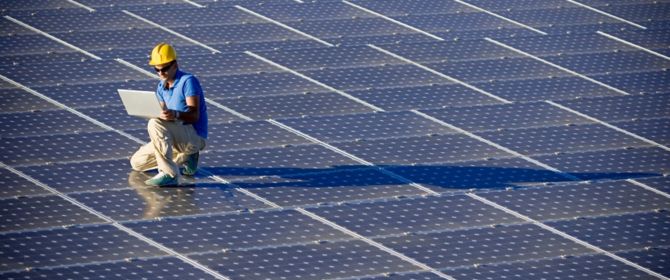AI takes over shopping malls in Europe, generating up to 40% in energy savings and reaching ESG targets
AI-based program helps shopping malls to use resources sustainably and avoid CO2 emissions
AI-based program helps shopping malls to use resources sustainably and avoid CO2 emissions
Over the past few years, the management of Estonia's largest shopping centers and whole business quarters, like for example the well-known tech hub Ülemiste City, has been gradually taken over by an AI-based program named Jenny. Developed by a local enterprise R8 Technologies, the program saves up to 40% of energy and helps to achieve ESG targets, as buildings use resources sustainably and avoid CO2 emissions.
R8 is a tech company created by AI scientists of local technical University (TalTech) and entrepreneurs. Based in Estonia, the company currently manages more than 2 million m2 in Europe’s business real-estate sector with main clients in the Baltics and Scandinavia.
R8 Technologies’ Jenny is an AI-based program that can be connected to the automation systems of modern buildings and use resources more efficiently to maintain the desired indoor climate. The program achieves this thanks to the inclusion of data from the past, present, and future, as well as 24/7 continuous work and hundreds of small changes from day to day, which result in at least 15% or up to 40% energy savings.
KPMG co-operates with R8 technologies to deliver property owners a comprehensive sustainability solution – from defining ESG strategy, implementing operational changes, generating instant energy and CO2 saving impact, monitoring and ESG reporting.
Tomas Otterström
ESG Transformation Lead
KPMG in Finland
The most sustainable shopping mall in Baltics
Viru Center is the most sustainable shopping center in the Baltics, which has been operating in Tallinn for over 20 years and has been named the flagship of local trade. Since 2019, the center has been the only one in the Baltics to be awarded the Platinum level of sustainability by LEED, which is based on, among other things, on economical energy use and up to 50% lower utility bills.
"Energy saving is an area where good profitability is clearly visible today. However, due to the environmental agenda, all projects aimed at energy saving have received additional motivation," Gertti Kogermann, CEO of Viru Center, introduces the conversation. "We have been looking for a long time ways to make all the systems in the house more efficient, from ventilation to insulation, to find synergy between them, and currently we implemented one of the best solutions in Estonia." Kogermann refers to cooperation with R8.
In the Viru Center, the platform is connected with the building automation systems, and as a result of a lot of work, the self-taught technical assistant performs both current analysis and system correction and control. "Today, R8 monitors the air quality, ventilation, insulation, cooling and energy consumption of the house using nearly 20,000 data points. After the measurements, the readings are linked to all the external and internal tasks assigned to him by the house. The result is better indoor well-being and really great energy savings."
According to the CEO of the center, the automation, harmonization and integration of systems with artificial intelligence helped to achieve the next level of efficiency. What's better, over time it constantly improves the results and really gets to know the house better. The result, together with other ongoing investments, is almost half of utility bills.
The greenest energy is the saved one
Saving energy automatically means a reflection in the company's utility bills, but nowadays resource efficiency also has even more important effect, i.e. helping the climate. "Each unit of energy consumed ultimately means CO2 emission. At R8, we are used to thinking that the greenest energy is saved energy, and thus we show our positive impact on the climate also in saved tons of CO2, which is currently more than 34,000 tons," introduces R8 CPO and AI scientist Dr. Ahmet Köse.
According to Ahmet, avoiding harmful carbon is possible primarily thanks to customers who are willing to contribute to the efficiency of their systems. "We work with clients from Finland and Germany to Portugal, and we see that absolutely every building has the potential for efficiency, for the simple reason that no base system and person are capable of working with full attention 24/7. AI does this routine work, and the result is that the energy class of every building increases at least by one level. Furthermore, if there are severe issues in the building's automation system, the potential energy savings could be even higher. We help our customers to reach their most optimal targets with our expert knowledge and support," adds Ahmet Köse.
Thanks to the implementation of a single program, it is possible to reduce costs as well as to meet sustainability requirements and the European Parliament's new standards regarding the energy classes of buildings.
ESG targets and reporting as a bonus
Approximately 36% of greenhouse gas emissions in the European Union are directly or indirectly associated with the real estate sector. Given the EU’s Green Deal target to reach Net Zero by 2050, real estate owners are under regulatory, social and investor pressure to become more sustainable. But it is not just about emissions and energy (environmental impact aspects) – sustainability is also how we care about people and run our business (framework known as ESG).
As of financial year 2025, sustainability (ESG) actions, targets and KPI’s of large real estate owners in EU will have to be disclosed as part of their annual business reports. This is due to the sustainability reporting requirement under the Corporate Sustainability Reporting Directive (CSRD) applicable to businesses that meet two of the three criteria: >EUR 20M in total assets, >EUR 40M in turnover, >250 employees.
“KPMG sees sustainability as well as being transparent about your commitments under ESG reporting as a strategic opportunity – it fosters innovation and can bring real benefits to companies, people and the planet. It is also a tool to communicate with your stakeholders and show that you are serious about their concerns. This is why we are excited to co-operate with R8 Technologies. Their AI-based solution solves many problems that building operators currently face – the practical problem of achieving established sustainability targets around energy performance, greenhouse gas emissions, air quality and people well-being as well as credible data availability, monitoring and reporting issues. With a push of a button R8 Jenny can generate a performance report that is ready to be used also for corporate sustainability reporting needs such as under CSRD requirements,” says Marko Rebane, Sustainability Manager at KPMG Baltics.
If you are interested in R8 technology and KPMG sustainability solutions, please contact us.
Author:
Marko Rebane, Sustainability & ESG Advisory, KPMG in Baltics

